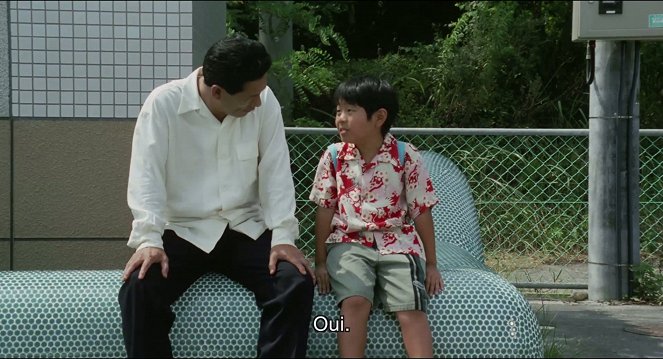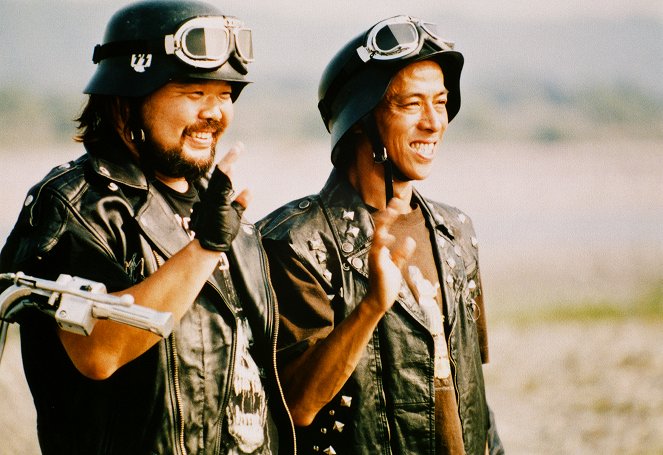Réalisation:
Takeshi KitanoScénario:
Takeshi KitanoPhotographie:
Katsumi YanagijimaMusique:
Joe HisaishiActeurs·trices:
Takeshi Kitano, Yūsuke Sekiguchi, Kayoko Kishimoto, Yūko Daike, Kazuko Yoshiyuki, Beat Kiyoshi, Gurēto Gidayū, Rakkyo Ide, Fumie Hosokawa (plus)Résumés(1)
Masao s'ennuie. Les vacances scolaires sont là. Ses amis sont partis. Il habite Tokyo avec sa grand-mère dont le travail occupe les journées. Grâce à une amie de la vieille femme, Masao rencontre Kijujiro, un yakusa vieillissant, qui décide de l'accompagner à la recherche de sa mère qu'il ne connait pas. C'est le début d'un été pas comme les autres pour Masao... (BAC Films)
(plus)Vidéo (2)
Critiques (3)
A wonderful lyrical poem about a boy who had been alone during the holidays, but in the end everything was different. Masaa's pilgrimage to find the mother he longs to see is an unusually conceived road movie, to which Takeshi Kitano gave his personal style through artistic acting and directorial conception that is somewhere between a child's diary and the poetic warmth of a European narrative film. The epic vein is de facto secondary, and the story culminates in the truest sense of the word when the film has gone through about half of the runtime. But it's not really about that. It's about enjoyment and feeling. Kitano's art of turning the journey of a boy and his guide – "uncle" a brute, a show-off and a buffoon – is extraordinary and, with gourmet slowness, a recited poems about love, naivety and childhood, achieves absolute perfection. The camera often distances itself from direct action and revels in lyrical panoramicization, the editing seemingly breaks the flow of time and often gives shards of events, artistic accessories and Masaa's dreams add a magical character to everything. Kikujiro's Summer is at its core kind of like a Japanese Kolya, but where Svěrák brought out tears, Kitano is an impressive poet who understood well that magic is not in the explicitness of the edict. His film has extraordinary humor, which the director himself ensures with his role as a rough clown (in a way very similar to the character Shinkichi from the later Kitano film Zatoichi: The Blind Swordsman). The humor of the "uncle" is full of blunders, overconfidence and very boorish behavior, but under which lies a good soul. The "uncle" attracts various other weirdoes, with the affection of created and staged characters, which provide Masaa with the strangest and most beautiful holiday. Hackneyed? Not in this package. Moreover, the music of the court bandmaster Hisaishi is simply brilliant, and with its fragile beauty and non-styling accurately captures the bitter-sweet note of Kikujiro's Summer. Because Kikujiro's Summer is not only a film about finding and joy, but above all about what we lose that makes us find it. It's a film that folds like a mosaic, and late at night I could hardly hold back fits of laughter as I watched the whole shape from a distance. Caressing my soul, that's all I can think of.
()
Takeshi spiced up this moving story about a boy wandering in search of his mother by including himself in the movie. His eternally grumpy and cursing uncle is probably the last person on the planet anyone would entrust a child to. This is a bit of a Japanese Kolya that doesn’t pull so hard of the heartstrings. But it’s more playful (the part with the bikers and the writer by the lake was like a return to childhood days) and maybe more believable too. Personally, I didn’t really like the dream sequences and the perhaps unnecessarily long beginning.
()
Takeshi Kitano is one of the most interesting figures in contemporary Japanese cinema and he can hardly make a bad film. However, Kikujiro is not among his best works. I had issues with its uneven pace, strong scenes alternating with dull passages, and the film overall feels too long. Additionally, the film includes scenes where the director overtly tries to impress the viewer. Overall impression: 65%.
()



Annonces